Genomic analysis of Paracoccus homiensis HT-F reveals its role in marine sulfur cycling
IF 1.5
4区 生物学
Q4 GENETICS & HEREDITY
引用次数: 0
Abstract
Dimethylsulfoniopropionate (DMSP) is a ubiquitous organosulfur compound produced by various marine organisms and plays a central role in global sulfur and carbon cycling through microbial catabolism. In this study, we present the complete genome sequence and functional annotation of Paracoccus homiensis HT-F, a marine bacterium isolated from intertidal algae of the Yellow Sea, China. The genome comprises a 2,714,952 bp circular chromosome with a GC content of 63.87 %, along with five plasmids ranging from 25,274 bp to 391,451 bp in size, yielding a total genome size of 3.33 Mb. We analyzed the potential of Paracoccus homiensis HT-F for DMSP metabolism based on genome annotation and homology-based analysis. The genome encodes key enzymes involved in both the cleavage and demethylation pathways of DMSP catabolism, as well as transporters and downstream acrylate-processing enzymes. Collectively, the genomic analysis of Paracoccus homiensis HT-F provides insights into the role of Paracoccus bacteria in DMSP-mediated marine sulfur cycling.
人副球菌HT-F基因分析揭示其在海洋硫循环中的作用
二甲基磺丙酸酯(DMSP)是一种普遍存在的有机硫化合物,由各种海洋生物产生,并通过微生物分解代谢在全球硫和碳循环中发挥核心作用。本研究报道了从黄海潮间带藻类中分离的一种海洋细菌人副球菌HT-F的全基因组序列和功能注释。该基因组包括2,714,952 bp的环状染色体,GC含量为63.87%,以及5个大小在25,274 bp至391,451 bp之间的质粒,总基因组大小为3.33 Mb。基于基因组注释和基于同源性的分析,我们分析了人副球菌HT-F对DMSP代谢的潜力。基因组编码参与DMSP分解代谢的裂解和去甲基化途径的关键酶,以及转运蛋白和下游丙烯酸酯加工酶。总的来说,人类副球菌HT-F的基因组分析为副球菌在dmsp介导的海洋硫循环中的作用提供了见解。
本文章由计算机程序翻译,如有差异,请以英文原文为准。
求助全文
约1分钟内获得全文
求助全文
来源期刊

Marine genomics
生物-遗传学
CiteScore
3.60
自引率
5.30%
发文量
50
审稿时长
29 days
期刊介绍:
The journal publishes papers on all functional and evolutionary aspects of genes, chromatin, chromosomes and (meta)genomes of marine (and freshwater) organisms. It deals with new genome-enabled insights into the broader framework of environmental science. Topics within the scope of this journal include:
• Population genomics and ecology
• Evolutionary and developmental genomics
• Comparative genomics
• Metagenomics
• Environmental genomics
• Systems biology
More specific topics include: geographic and phylogenomic characterization of aquatic organisms, metabolic capacities and pathways of organisms and communities, biogeochemical cycles, genomics and integrative approaches applied to microbial ecology including (meta)transcriptomics and (meta)proteomics, tracking of infectious diseases, environmental stress, global climate change and ecosystem modelling.
 求助内容:
求助内容: 应助结果提醒方式:
应助结果提醒方式:


